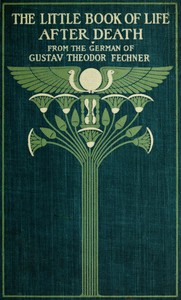The little book of life after death by Gustav Theodor Fechner
"The Little Book of Life After Death" by Gustav Theodor Fechner is a philosophical treatise written in the early 19th century, specifically published in the 1830s but later translated into English in the early 20th century. This book explores the metaphysical ideas surrounding life after death, offering a perspective that combines psychology, spirituality, and a critique of materialism. It delves into the transitions of human existence, proposing that human life comprises three
stages, with death being a continuation rather than an end. In this work, Fechner posits that death is akin to a second birth, transitioning the spirit into a higher plane of existence where it is no longer confined by the physical body. He articulates a vision of life where each person's essence continues to exist as part of a larger consciousness, contributing to a communal spiritual life. The narrative weaves together notions of reincarnation, spiritual continuity, and the interconnectedness of all human experiences, emphasizing that the memories and influences of the deceased ripple through the living. Through a philosophical lens, Fechner urges readers to recognize the enduring impact of thoughts and actions, both in life and beyond, thus portraying death not as an end, but as an integral aspect of an ongoing existence intertwined with universal consciousness. (This is an automatically generated summary.)
Read or download for free
| Reading Options | Url | Size | |||
|---|---|---|---|---|---|
| Read now! | https://www.gutenberg.org/ebooks/74480.html.images | 141 kB | |||
| EPUB3 (E-readers incl. Send-to-Kindle) | https://www.gutenberg.org/ebooks/74480.epub3.images | 609 kB | |||
| EPUB (older E-readers) | https://www.gutenberg.org/ebooks/74480.epub.images | 608 kB | |||
| EPUB (no images, older E-readers) | https://www.gutenberg.org/ebooks/74480.epub.noimages | 281 kB | |||
| Kindle | https://www.gutenberg.org/ebooks/74480.kf8.images | 1.3 MB | |||
| older Kindles | https://www.gutenberg.org/ebooks/74480.kindle.images | 1.0 MB | |||
| Plain Text UTF-8 | https://www.gutenberg.org/ebooks/74480.txt.utf-8 | 117 kB | |||
| Download HTML (zip) | https://www.gutenberg.org/cache/epub/74480/pg74480-h.zip | 985 kB | |||
| There may be more files related to this item. | |||||
Similar Books
About this eBook
| Author | Fechner, Gustav Theodor, 1801-1887 |
|---|---|
| Author of introduction, etc. | James, William, 1842-1910 |
| Translator | Wadsworth, Mary C. |
| LoC No. | 04024584 |
| Uniform Title | Das Büchlein vom Leben nach dem Tode. English |
| Title | The little book of life after death |
| Original Publication | United States: Little, Brown, & Company, 1904. |
| Credits | Peter Becker, David E. Brown, and the Online Distributed Proofreading Team at www.pgdp.net (This file was produced from images generously made available by The Internet Archive) |
| Reading Level | Reading ease score: 57.0 (10th to 12th grade). Somewhat difficult to read. |
| Language | English |
| LoC Class | BT: Philosophy, Psychology, Religion: Christianity: Doctrinal theology, God, Christology |
| Subject | Immortality |
| Category | Text |
| EBook-No. | 74480 |
| Release Date | Sep 26, 2024 |
| Copyright Status | Public domain in the USA. |
| Downloads | 430 downloads in the last 30 days. |
| Project Gutenberg eBooks are always free! | |

